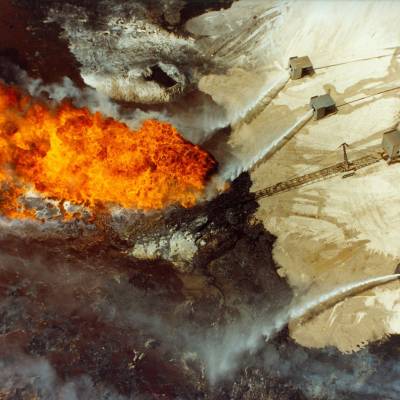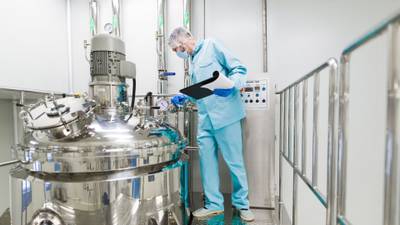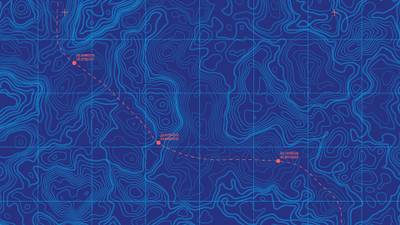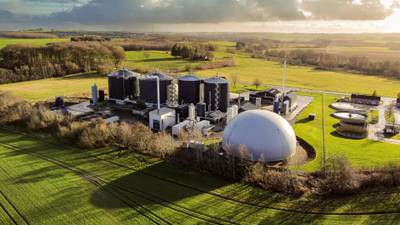Master the basic concepts and tools of safety and risk management within the chemical, petroleum, oil and gas, and energy industries.
- Study the technical aspects of safety and loss prevention, risk identification, quantification and management techniques.
- Expand your knowledge of process safety, safety and reliability, and applied engineering.
- Learn from the best in the business, with a university at the forefront of professional training for ambitious engineers.
You’ll attain vital skills and a career advantage as a graduate or practising engineer.

Build credits towards a Masters degree
This online course is part of:
- MSc Advanced Chemical Engineering
- MSc Offshore Engineering
- MSc Oil and Gas Engineering
- MSc Process Safety Engineering
- MSc Safety and Reliability Engineering
- MSc Subsea Engineering
You can use the credits you earn on this short course towards any of these MSc qualifications.
What you’ll study
You’ll explore risk-assessment tools and the fundamentals of safety and risk management.
You’ll gain an introduction to:
- risk assessment and classical reliability theory
- ALARP (as low as reasonably practicable) as a principle
- safety regulatory frameworks
- hazard identification, including brainstorming, checklists, safety performance indicators, incident and inspection reports, structured what-if technique (SWIFT), and safety audits.
You’ll also cover the following:
- Risk assessment techniques, including reliability block diagrams, event trees, fault trees, failure mode and effects analysis (FMEA)
- Major accident prevention policies (MAPP)
- Safety procedures and inherently safe design
- Reliability, availability, and maintainability (RAM)
- Failure analysis and maintenance
- Bowtie diagrams, to analyse and demonstrate causal relationships in high-risk scenarios
- Layers of protection analysis (LOPA)
- Overview of safety standards and functional safety
- Case histories
By the end of this course, you’ll be able to…
-
Describe the concept and rationale of ALARP and how to achieve it.
-
Explain risk identification techniques and how to apply selected techniques for industrial processes and operations.
-
Use selected qualitative, quantitative and semi-quantitative techniques for risk identification and management.
-
Develop quantitative methods of risk management for new processes and existing operations.
-
Develop quantitative frameworks for reliability, availability and maintenance for selected industrial processes.
-
Communicate the legal framework for risk and reliability assessment.
Why study Engineering online with the University of Aberdeen?

Flexible
Flexible hours and 24/7 access, so you can study when it suits you.

Led by industry
Your course content is developed and reviewed by an Industry Advisory Board, so your training is always cutting edge and industry-relevant.

20% alumni discount
University of Aberdeen alumni get 20% off fees for this online course.
How you’ll study
Online learning
This distance-learning Safety and Risk Management course is delivered flexibly, 100% online.
You can learn with us anywhere in the world, no student visa required, and manage your study hours to suit you.
Your teaching
This course is taught at Masters level.
Teaching is delivered through MyAberdeen, our online Virtual Learning Environment (VLE). It holds all the materials, tools and support you’ll need in your studies. Take a look around MyAberdeen.
You can access your learning materials on computer, smartphone and laptop, 24 hours a day. You’ll find a range of resources available, including:
- online lectures and tutorials
- reading materials
- discussion boards with your tutors and peers
- the online resources of our award-winning Sir Duncan Rice Library.
Your tutors
This Masters-level short course is delivered by our School of Engineering.
You’ll learn from highly qualified and experienced tutors, engineers and experts from the University and industry itself.
Industry input
You’ll also benefit from the direct input of an Industry Advisory Board. It constantly reviews your course content to ensure you’re gaining the latest industry knowledge and are up to speed with emerging trends, technologies and career opportunities.
Based in Aberdeen, we’re able to attract industry leaders from a range of sectors to deliver lectures for you. As well as imparting their knowledge and experience, they’ll help you explore your career options.
You’ll be assessed online. Assessment will take place throughout the teaching term.
Types of assessment for this course may include:
- coursework
- online quizzes
- timed online open-book assessments.
Assessment deadlines
Your assessments will have submission deadlines, either during or at the end of the course. Your course coordinator will let you know when your assessment deadlines are, so you can plan your study time accordingly.
The course totals approximately 150 hours of study and assessment time. That’s around 10 – 15 hours per week.
This is an indicative guide to the time required for a typical student at this level to achieve the learning outcomes. This includes time for independent study, as well as teaching and assessments.
You can largely set your own study hours each week to cover the materials. MyAberdeen is available 24/7, so you can log in and study when it suits you.
Activities at fixed times
There may be some activities scheduled for fixed times. This could include coursework and assessments with deadlines, or online meetings with your tutor. Otherwise, you can access and work through the course at your convenience.
Our first-class support structure will ensure that you aren’t alone in your studies.
You’ll have contact with your coordinator via email, MyAberdeen, Microsoft Teams, or phone. You can use social media and discussion boards to chat with your fellow students too.
We provide a wide range of services to support you in your studies and beyond:
- Careers and Employability Service
- Disability support
- IT support
- Library support
- Student Support Service – help with finances, wellbeing and non-academic issues
- Student Learning Service – study support, with advice sessions available
- Aberdeen University Students’ Association (AUSA) – run by students for students
- Toolkit – clever apps and free training that can make your study life easier
Wherever you are in the world, you’ll feel part of our very special Aberdeen learning community.
Your course coordinator

Dr Henry Tan
Henry is a Senior Lecturer in our School of Engineering and will be your course coordinator.
He works in safety science, corrosion, and material failure.
Henry collaborates with industry, including BP and DNV, on using multidisciplinary digital twin technology for safety-critical systems in the energy transition.
View Henry’s profileWhere this will take you
Towards a Masters
You’ll earn 15 credits at Masters level (SCQF Level 11) with this course. You can use these credits towards our online:

Masters in Advanced Chemical Engineering
Develop your knowledge and qualifications in chemical engineering, design and practice, with an emphasis on safety and sustainability. Study flexibly online in this degree that fits around full-time work.
View MSc Advanced Chemical Engineering
Masters in Offshore Engineering
Join our accredited online MSc and gain the skills you need to work in a wide variety of roles in the offshore engineering sector, including marine renewables.
View MSc Offshore Engineering
Masters in Oil and Gas Engineering
Join an accredited online Masters degree delivered from the Energy Capital of Europe. Master the skills and technologies you need to pursue a career in the upstream and downstream oil and gas industry.
View MSc Oil and Gas Engineering
Masters in Process Safety Engineering
Become a qualified process safety engineer, ready to work in any chemical processing sector. Join an online degree you can fit around full-time work.
View MSc Process Safety Engineering
Masters in Safety and Reliability Engineering
Become a world-class safety engineer, wherever you’re based, with this accredited online MSc. Train online with internationally experienced safety engineers and learn direct from industry.
View MSc Safety and Reliability Engineering
Accredited Masters in Subsea Engineering
Become a subsea engineer with our accredited online MSc. Train in the fundamental skills and technical knowledge demanded by the subsea sector today.
View MSc Subsea EngineeringBuild your learning
We offer a range of specialist online engineering and technology courses you can use to build your skills.
Many carry credits you can build up into postgraduate qualifications, including Masters degrees:
Careers
This course is designed to help you develop your career in safety and reliability engineering and risk management. There’s a continuing high demand for people with specialist knowledge in these areas as a result of:
- new legal requirements to assess and control industrial risks to people and the environment
- the need to create high-integrity engineering systems in many industries.
The concepts you’ll learn on this course are applicable to any industry, not just oil and gas.
Continuing Professional Development (CPD)
Your employer or professional institute may recognise this course for CPD. Talk to your employer or institute to find out more.

Free career support
Access our free careers service while you study.
- 1:1 appointments
- CV checks
- Interview prep
- Job opportunities
Entry requirements
Entry requirements
We welcome students from all over the world.
This course has no formal entry requirements. You do not need to provide proof of your qualifications.
But you do need to check the entry guidance above to understand the level of teaching delivered, to decide if this course is right for you.
If you do not have qualifications from the UK, check the equivalent teaching level for your country.
Visa requirements
You do not need a student visa to study online with us.
English language requirements
Teaching is delivered in English.
You do not have to provide proof of your English language skills to join this course. But we want to make sure that you can use English well enough to study successfully.
Recommended level of English
For this course, we recommend the following level of English language proficiency.
These are our Postgraduate Standard requirements, and these are minimum scores.
IELTS Academic, IELTS UKVI Academic, or IELTS Online (not IELTS Indicator or IELTS General Training)
- 6.5 overall
- 5.5 for listening, reading and speaking
- 6.0 for writing
TOEFL iBT or TOEFL iBT Home Edition
- 90 overall
- 17 for listening
- 18 for reading
- 20 for speaking
- 21 for writing
- TOEFL DI code is 0818
Cambridge English: B2 First, C1 Advanced, or C2 Proficiency
- 176 overall
- 162 for listening, reading and speaking
- 169 for writing
LanguageCert Academic / LanguageCert Academic SELT
- 70 overall
- 60 for listening, reading and speaking
- 65 for writing
Oxford ELLT Digital – English Language Level Test Online
- 7.0 overall
- 5.0 for listening, reading and speaking
- 6.0 for writing
PTE Academic (online test not accepted)
- 62 overall
- 59 for listening, reading, speaking and writing
Skills for English: SELT
- B2 pass with merit
Duolingo – tests taken from 1 July 2024 onward
- 120 overall
- 95 for listening, reading and speaking
- 105 for writing
University of Aberdeen English Pre-sessional Programme (PSE)
- Pass
- Valid for one year. Refresher can be offered if out of date
Pre-sessional academic English preparation programmes undertaken at other UK universities
- Pass at an equivalent of 6.5 (C1)
- B2 in all four skills
- Certification must be within one year prior to the start of your course
For full information about language requirements, see our English Language Requirements page.
You will need access to:
A computer (PC, laptop or Mac) with an up-to-date operating system
Most teaching materials are smartphone- and tablet-friendly. But we recommend a proper laptop or desktop for completing assignments comfortably.
Reliable internet access
We recommend:
- a wired connection
- a minimum download speed of 2 Mbps so you can take part fully in live sessions.
Speakers or headphones
- We recommend a headset with built-in microphone and earphones if you’re likely to study in an environment with background noise.
- A webcam is optional, but you may like to use one for some interactive sessions.
Software
We’ll give you access to Office365 applications. This means you can use online versions of Microsoft Word, Excel, PowerPoint and OneDrive and install these programs on up to five personal devices.
If your course requires specialist software, we’ll provide you with access to this and a licence that lasts throughout your studies.
See our detailed IT requirements for more information.
When you study with us, you can expect a first-class support structure so that you’re never alone in your studies.
But learning online does mean you have to motivate yourself and manage your own time.
Your most important commitment will be time – the time to work through, reflect on and understand your teaching materials.
Before you start a course that involves a high degree of independent study, we recommend looking at the time you will be able to devote to your studies each week:
- Be realistic
- Create a weekly schedule as a guide
If you have any questions about studying online, get in touch with our friendly team. We’re here to help.
Fee payment
Your course fee needs to be paid in full before you start your course.
We accept payment via Visa Debit, Visa Credit and Mastercard.
Ways to save
You may be able to get help funding this course via:
- discounts – if any discounts are available for this course, they’ll appear in the section below
- employer sponsorship – we accept full and partial fee payments from sponsors.
Find out more about funding options.
Student card
All our students are entitled to a University of Aberdeen student card. This gives you access to a range of student discounts around the city and online.
Learning resources
Access to all the essential books and resources you need are included in your tuition fee. They’ll be made available to you online and you do not have to buy your own copies.
We also provide optional recommended reading lists. Many of these resources are available electronically through our library, although purchases may be required if you wish to read the full list.
Printing
You may want to set aside a small budget for printing, depending on how you like to work.
This course includes many of the same learning outcomes as our online short course in Engineering Risk and Reliability Analysis. We do not recommend that you study this course alongside Engineering Risk and Reliability Analysis.
Entry requirements
This course has no formal entry requirements. You decide if it’s suitable for you.
The course is delivered at Masters level. For this course, you’d usually have:
- a 2:2 UK honours degree (or equivalent) in Engineering or Physical Sciences, and/or
- some experience in safety management or risk assessment.
Familiarity with basic risk assessment techniques, such as event trees and fault trees, is beneficial.
As the course involves practical assignments in risk analysis and safety management, competence in using basic analytical tools and methods is advantageous.



























































